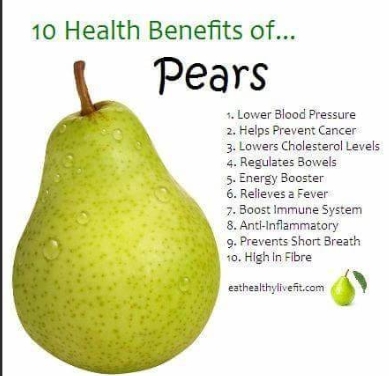Pears are a delicious and nutritious fruit that offer a wide range of health benefits. With their sweet and juicy flavor, they are enjoyed by many people around the world. Beyond their taste, pears are packed with essential nutrients such as fiber, vitamins, and antioxidants, making them a great addition to a healthy diet.
One of the standout features of pears is their high fiber content, particularly soluble fiber, which can aid digestion and promote gut health. The fiber in pears helps regulate bowel movements, prevent constipation, and maintain a healthy digestive system. In addition, the fiber content helps keep you feeling full for longer, making pears a great choice for those looking to manage their weight or avoid overeating.
Pears are an excellent source of vitamin C, an antioxidant that plays a key role in boosting the immune system and protecting the body from harmful free radicals. Vitamin C also supports the production of collagen, a protein that is essential for the health of your skin, blood vessels, and bones. A medium-sized pear can provide about 12% of your daily recommended intake of vitamin C.
Rich in antioxidants, pears help reduce oxidative stress in the body and lower the risk of chronic diseases, such as heart disease, diabetes, and certain cancers. The antioxidants found in pears, such as flavonoids, have anti-inflammatory properties that can reduce inflammation and promote overall health. These antioxidants also help protect cells from damage caused by free radicals, which can contribute to aging and disease.
Pears have a high water content, which makes them a hydrating fruit that can contribute to your daily fluid intake. Staying well-hydrated is essential for maintaining healthy skin, regulating body temperature, and supporting various bodily functions. The high water content in pears can help keep your skin moisturized and your body functioning at its best.
In addition to their high fiber and water content, pears are low in calories, making them a great option for anyone looking to maintain or lose weight. The fiber in pears not only aids digestion but also helps regulate blood sugar levels by slowing the absorption of glucose. This can help prevent blood sugar spikes and crashes, making pears a great choice for people with diabetes or those looking to maintain stable energy levels throughout the day.
Pears can also contribute to heart health. The fiber, potassium, and antioxidants found in pears work together to support healthy blood pressure levels and reduce the risk of cardiovascular disease. Potassium, in particular, helps regulate fluid balance in the body, supports proper muscle function, and aids in maintaining healthy blood pressure levels.
Eating pears regularly can also benefit your oral health. The crunchy texture of pears helps stimulate saliva production, which neutralizes acids in the mouth and protects against tooth decay. The natural sugars in pears are not as harmful to teeth as refined sugars, making pears a tooth-friendly fruit to include in your diet.
Pears are versatile and can be enjoyed in various ways. You can eat them fresh, add them to salads, bake them into desserts, or blend them into smoothies. Pears pair well with a variety of other foods, such as cheese, yogurt, and nuts, making them a perfect addition to many different types of meals and snacks.
When choosing pears, look for fruits that are firm but slightly tender when pressed. Different varieties of pears, such as Bartlett, Bosc, and Anjou, each offer a unique flavor and texture, so feel free to experiment with different types to find the one that you enjoy the most.
If possible, choose organic pears, as conventional pears may be treated with pesticides. Regardless of the variety or type, make sure to wash pears thoroughly before eating to remove any dirt or pesticide residue.
Incorporating pears into your diet is an easy and delicious way to boost your nutrient intake. With their numerous health benefits, including improved digestion, immune support, and heart health, pears are a fantastic fruit to enjoy as part of a balanced and nutritious diet.





